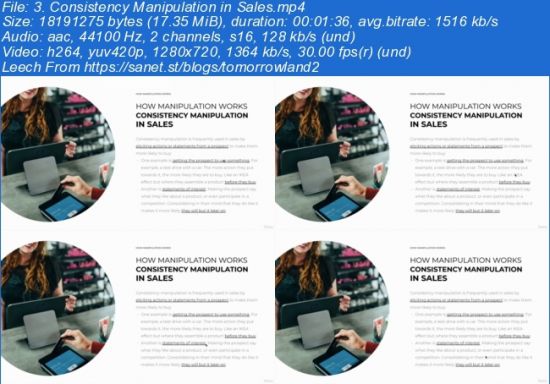How Manipulation Works in Sales

Created by Vasco Patrício | Last updated 9/2021
Duration: 1h 19m | 1 section | 20 lectures | Video: 1280x720, 44 KHz | 843 MB
Genre: eLearning | Language: English + Sub
The different types of manipulation that salespeople use (or fall prey to!) - as well as how to fight them
What you'll learn
The different types of manipulation that can occur in a sales setting
Specific examples of how each type of manipulation may be used in selling or pitching
How to protect yourself against each of these types as a buyer (or as a salesperson!)
Combinations of the different types of manipulation during a sales proces
Requirements
None. A basic knowledge of persuasion helps (knowing what is social proof, consistency, authority, etc), but it's NOT required.
Description
SELLING;OR;MANIPULATING?
You will find it basic if I;say that, in sales, manipulation techniques are often used.
These can range from manipulating the facts, making flattering comparisons, using emotional manipulation, and/or many others.
As a persuasion expert, I have catalogued all different types of manipulation, and that is what you will find in this course.
You'll learn more about how every single type of manipulation can be leveraged in a sales setting.
\n
\n
LET;ME;TELL;YOU... EVERYTHING
Some people - including me - love to know what they're getting in a package.
And by this, I;mean, EVERYTHING that is in the package.
So, here is a list of everything that this course covers:
How someone can manipulate someone's consistency by getting them to take action or say something positive about a product, which makes them more likely to buy - a "consistency trap";
How a salesperson can leverage emotional manipulation by both building up anticipation and expectations in the person, but also "twisting the knife" and making them illustrate the worst-case scenario of not having the product, among other types of emotional techniques;
How salespeople can leverage effort manipulation. In short, making something seem "easier", "faster" or "simpler" to buy. Also, preempting doubts you may have to cut off your options when buying;
How someone can leverage standard manipulation by comparing different products/offerings using different standards, or hiding the criteria, to make the comparison flattering to their specific product/offer;
How someone can leverage pressure manipulation to intimidate, guilt or shame the person into buying something;
How salespeople frequently leverage identification manipulation, making it seem like they have something in common with the buyer, or at least, making them feel understood, so that they buy more easily;
How salespeople can leverage fact manipulation, literally twisting the facts, omitting some or changing their context so that the person can listen to the same facts but have radically different perceptions of them;
How a salesperson can leverage context manipulation, making their product or offering seem better by comparison, but changing the options or the emphasis given, manipulating that comparison;
How salespeople can leverage labeling manipulation, either using negative, reductive labels to reduce the competition to negative traits, or positive, reductive labels to make themselves look better, or using the presence or absence of names;
https://CourseLala.com
